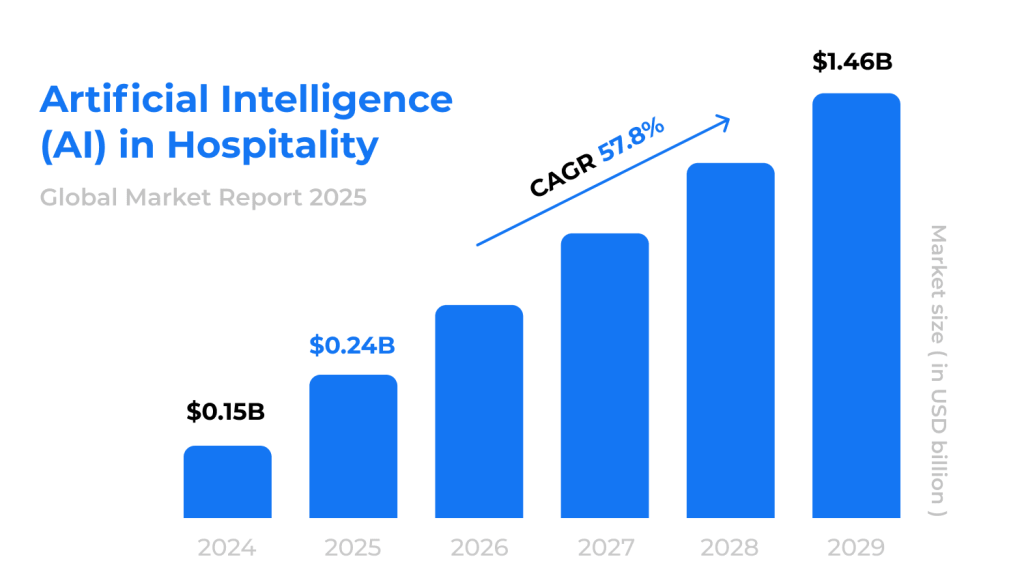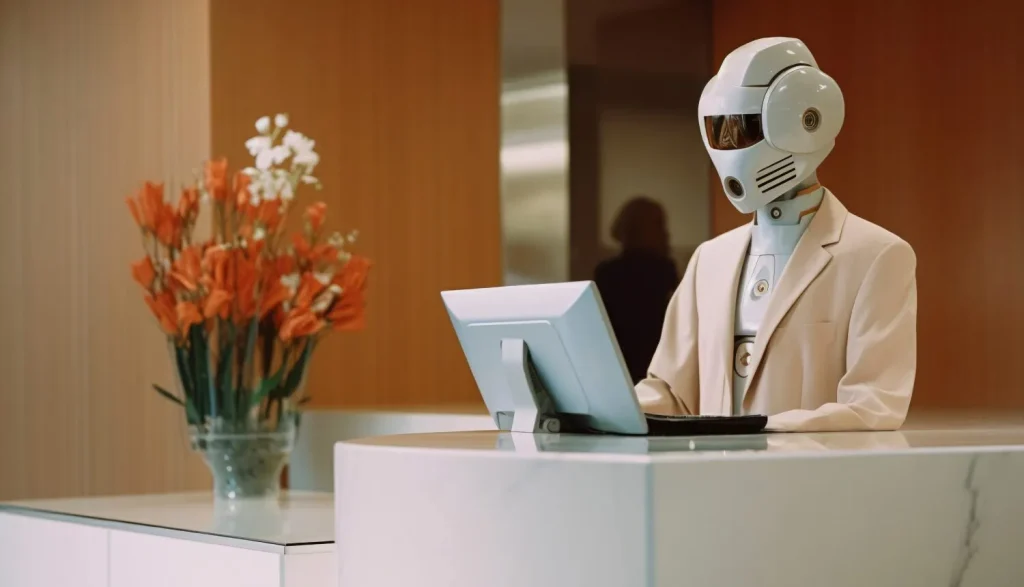
There was a time when a clean room and a free breakfast were enough to win guests over. Not anymore.
Today’s travelers want more than comfort; they want personalized experiences from start to finish. And it’s not just a passing trend. This shift is reshaping the entire hospitality industry. Leading the charge? Artificial intelligence (AI).
In fact, the global AI in hospitality market is expected to jump from $150 million in 2024 to $240 million in 2025, growing at a massive 57% per year.

From booking to check-out, hotels and resorts are using AI to create smarter, more meaningful stays. Let’s break down how it all works — with real examples and a look into what’s coming next.
1. Smarter Booking: Personalized from the Start
The guest experience now starts before you even arrive, and AI makes that first interaction feel personal.
Hilton is a great example. Their AI-driven booking system doesn’t just let you pick a room. You can choose your favorite pillow type, a room near the elevator, your preferred check-in time, and more. The system remembers your past stays and makes smart suggestions just for you.
It’s not just big hotel chains doing this. Boutique hotels are also using AI to personalize offers by analyzing customer data, behavior, and even social media. That’s how you get a birthday discount or a room with the view you love without even asking.
Bottom line? AI turns a basic transaction into the start of a customized journey.
2. AI Concierge: 24/7 Help That Feels Human
Once you’ve booked, AI steps in again, this time to help during your stay.
Meet Connie, Hilton’s AI-powered robot concierge. She stands in the lobby, answers questions, and gives recommendations using natural, human-like conversations. Built with IBM Watson, Connie is fun and surprisingly helpful.
But most AI concierges aren’t robots. They’re chatbots on hotel websites, apps, or messaging platforms. They
- Help you check in
- Book spa appointments or restaurants
- Answer FAQs instantly
- Send follow-ups after requests
The big win? These bots are available 24/7, so guests never have to wait or hunt for help. And the more they’re used, the smarter they get, learning what guests want and responding even better over time.
AI doesn’t take away the human side of hospitality; it frees up staff to focus on the personal touches that really matter.
3. In-Room Personalization: A Smarter, Comfier Stay
Step into a modern hotel room, and AI might already be working quietly, making the space feel just right.
Virgin Hotels uses an app called “Lucy” that controls everything from the lights and thermostat to room service and the TV. What’s cool is that Lucy remembers your preferences from past stays, so your room feels like it’s already “you.”

AI also powers:
- Smart climate control: Rooms adjust to your ideal temperature
- Lighting scenes: Lights match the time of day or mood
- Personalized streaming: TV shows and movies you love, ready to go
- Voice assistants: Ask for towels or room info hands-free
- Room setup: Favorite pillow, minibar snacks, wake-up settings already there
This kind of seamless comfort is what keeps guests coming back. AI helps hotels make rooms feel less generic and a lot more like home.
4. Better Guest Engagement: Smart, Timely Suggestions
AI doesn’t just react; it predicts.
From the moment you book, AI starts making suggestions tailored to you. Hotels now send:
- Welcome emails with tips about local attractions
- Upsell offers that match your trip (like room upgrades or late check-out)
- Food and activity suggestions based on your profile
- Alerts about events near your hotel
- Smart itineraries that adjust based on weather or your plans
All of this creates personalized moments that feel helpful, not pushy, and often lead to extra revenue for hotels without annoying the guest.
5. Behind-the-Scenes AI: Making Operations Smoother
While guests enjoy the experience up front, AI is doing major work in the background.
One of its biggest roles? Forecasting demand. By looking at past data, local events, and seasonal trends, AI can predict when a hotel will be busy, helping managers staff accordingly, stock supplies, and prep services in advance.
It also:
- Spots patterns (like popular check-out times)
- Suggests when to offer special perks (like late check-out after a local concert)
- Helps streamline cleaning, dining, and maintenance schedules
This helps hotels run leaner and smarter, saving money and delivering better service.
6. Generative AI: Personalized Communication at Scale Now we’re seeing hotels use generative AI tech that writes, responds, and creates like a human.
Hotels use it to:
- Write personalized emails
- Answer reviews or messages automatically
- Power chatbots that match the hotel’s tone and brand
Soon, it’ll go even further:
- Create custom itineraries on the fly
- Show travel tips on screens around the hotel
- Design ads or promotions based on real-time guest behavior
This lets hotels communicate at scale while still keeping the tone personal and warm.
7. The Challenges: Tech With a Human Touch
As great as AI is, it comes with responsibilities.
Privacy and Data Security
Hotels handle a lot of guest data. Protecting it is a must with strong encryption, clear policies, and strict rules around consent.
Keeping the Human Feel
AI should enhance service, not replace it. Great hospitality still relies on empathy, creativity, and human connection.
Training and Change
Staff need training to work alongside AI. It’s important they see it as a support tool, not a threat.
8. What’s Next: The Future of AI in Hospitality
We’re just getting started. In the near future, expect to see:
- AI that predicts your needs before you say a word
- Systems that sync booking, loyalty, service, and marketing in real time
- Experiences that adapt to your behavior instantly
- Cross-platform personalization (web, app, in-room screens)
- Voice or even gesture controls in rooms
- Sustainability options tailored to your values
AI won’t take the place of hospitality; it’ll make it smarter, faster, and more personal than ever.
Final Thought: Smart Tech, Human Heart
Across every part of the guest journey, AI is helping hotels create better, more personal experiences. But the heart of hospitality care, connection, and service is still human.
When used with purpose, AI gives hotel teams more time to focus on what matters most: making people feel seen, heard, and welcomed.
